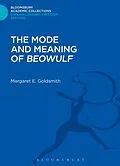In this important contribution to Anglo-Saxon studies Dr Goldsmith presents a fully elaborated and documented interpretation of Beowulf based on the original theories which she has put forward in recent years and which have aroused considerable interest and controversy in scholarly circles. Her view of the poem as the product of a marriage of cultural traditions, a historical epic with allegorical significance, is developed in the context of a close analysis of the doctrinal and literary environment prevailing during the period A.D. 650-800, within which composition is placed. Dr Goldsmith seeks to show that the poem has a unified and coherent structure and in the process resolves many textual and interpretative problems of long standing. Beowulf is clearly seen as a serious work of art standing at the head of the vernacular tradition of allegorical poetry.
Autorentext
Margaret E. Goldsmith was Lecturer in English at the University of Bristol.
Inhalt
Abbreviations
1. An Approach to the Critical Problem
2. Doctrine and Symbolism in the Teaching and Practice of the Christian Faith, A.D. 650-800
3. The Marriage of Traditions in Beowulf: Secular Symbolism and Religious Allegory
4. The Nature of the Adversaries
5. God and Man in the Poem
6. Hrothgar's Admonition to Beowulf
7. The Nature of the Hero
8. Structure and Meaning
Select Bibliography
Index
